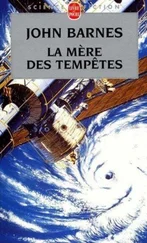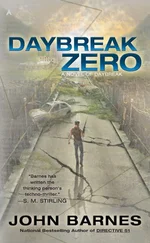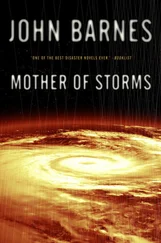The heat radiated by the fireball was effectively far greater than that in a familiar fission-triggered bomb, because the fireball lasted much longer; it charred skin 100 miles away, and set dry treetops on fire as far as 150. The most remote fires it triggered, in the suburbs of Philadelphia, in office towers in Richmond, and on some east-facing hillsides in Charles-ton, West Virginia, burned uncontrolled. Weeks after Daybreak, almost nothing and no one was left to fight them; fires spread across that whole vast area.
Blast effects were less than they might have been with an old-school H-Bomb of the same megatonnage, but still, the blast wave toppled office buildings at twenty miles and knocked down houses at sixty.
Every pure fusion weapon is innately a neutron bomb, creating deadly levels of fast neutrons at distances where people under cover can survive the flash and blast—sixty miles away, anyone sheltered from the terrible burning light and the flying rubble received a payment-due from Death, to be collected at leisure after days or weeks of diarrhea, vomiting, hemorrhage, and lesions.
The bomb that burst in a Chicago warehouse at the same moment did many of the same things; the famous skyline was gone. A four-story-high wall of boiling water rolled north on Lake Michigan, and over the next three hours the towns on the shore drowned, and the big wave still had energy enough to cause flooding around Huron and Superior as well. Immediate deaths were fewer, for the great fires in Chicago and Milwaukee had emptied those cities; most of those vaporized, buried, burned, and irradiated were already corpses. Still, the immense plume of neutron-bathed water, silicon, nitrogen, and carbon rained down across the northeastern United States, fell into the ocean even a hundred miles out, and commingled with the ashes of Washington on the Atlantic floor, and for the first few days, it was intensely radioactive, and many humans and many more creatures, especially the mammals and birds, received the dose that would kill them in the coming weeks.
On October 31st, as the world slipped into chaos, a ship had anchored in the North Sea, four long, strong cables securing it to the bottom, at a point carefully located with the GPS systems that were still working at the time, on a line between London and Antwerp. Now, in the early hours of the evening, the black sphere in the abandoned ship detonated; the mass of water it vaporized and converted into a superheated shock wave was about one-quarter the volume of Lake Erie.
London, Dover, Lille, Calais, and the cities of the southern Netherlands burst into widespread flames, great conflagrations that were to burn on for days. Some fires, where particularly flammable objects were facing the fireball, broke out as far away as York, Amsterdam, and Paris, and the mighty artificial tsunami from the blast topped and breached dikes all along the Dutch coast and carried mountains of debris into all the channels of the Rhine; in that instant every chart became obsolete, and for decades the river would be finding new courses.
Because the bomb had detonated in seawater, across the next forty-eight hours, deadly radiosodium and tritium fell in dust-gray salty snow as far east as Moscow. Europe had been freezing, starving, and disintegrating before; radiation poisoning killed millions, and before the spring, millions more, their immune systems weakened by the radiation, died of tuberculosis, cholera, typhus, flu, plague, and every old returning enemy of humanity.
The bomb in Jerusalem took most of the inhabited parts of Israel, the West Bank, Gaza, Jordan, and southern Syria. Detonated on land, like the Chicago bomb but with even less water, it caused a rain of radioactive tektites, some falling as far away as India; in centuries to come, the Monist faith would declare those bits of glass, in which the only remaining relics of several peoples and of shrines sacred to three great faiths were intermingled eternally, to be sacred. There were more than enough so that, no matter how big the Monist Confession grew to be, all Monists could have as many sacred tektites as they wanted.
Shanghai, Nanjing, and Hangzhou formed an equilateral triangle; at the center, the fifth great explosion worked its same monstrous results.
Though it was one of the Earth’s largest cities, with a huge population to feed and care for, the combination of discipline and cooperation, plus the sizable fishing fleet and better-than-average food reserves, had been working in Shanghai, and while there was misery enough for everyone, there had been relatively few deaths, and the civil order, if far from perfect, was functioning. In the last ten days, emissaries from Shanghai had been out to negotiate with the smaller cities that could be reached on foot or on the new oiled-linen-tire bicycles that one entrepreneur had created. Boats had begun to go south along the coast to the other commercial cities, and there had been talk of a Next China, of which Shanghai would be the leading city.
That was over in the blast and flame that smashed the western side of the city and set much of it on fire. The Shanghai city government staggered on for most of a week until deaths from neutron-induced radiation poisoning finally brought everything to a halt; the fires that had been almost controlled by hand pumping and bucket brigades broke out anew, and finished the city off in the next few days.
In Buenos Aires, perhaps the assemblers had been less careful, or the biotes had been luckier. The sixth black sphere had been breached, the enclosing plastic sphere had turned to slime, and the lithium deuteride lay in a heap in its bottom, asymmetric with respect to the nanoswarm-encrusted sphere of 131 pure fusion charges. Less than twenty of them fired. They vaporized the lithium deuteride, fused a very small bit of it, and mostly just scattered it around, creating a dense cloud of poisonous, corrosive gas that drifted into the harbor and out into the great mouth of the Rio Plata, where it killed so many fish that the sea wind stank all that following summer. The blast itself, not much more than a kiloton, leveled ten city blocks around the harbor, killed over two thousand people, broke countless windows, and scared the hell out of everyone, but by morning the next day, as news trickled in from the rest of the world, Argentines thought of themselves as the luckiest people on Earth.
ABOUT THE SAME TIME. FORT BENNING. GEORGIA. (DRET COMPOUND.) 7:30 A.M. EST. TUESDAY. DECEMBER 3.
Graham had insistently told her, after the funeral, that he was rising at 5:30 most mornings and it would be all right to knock on his door at any time after 5:45, especially if she needed company. Heather had awakened at 5:35, having slept for almost twelve hours, unable to go back to sleep, lonely, and sad. Annoyed at herself, she had knocked on Graham’s door.
He’d welcomed her in to eggs, toast, and bacon, and had to be talked out of using up his last reserve of instant coffee. Instead, after cups of hot chicory milk, he’d put the kettle on and made tea to put in sip-cups (hers with powdered milk and brown sugar, the way she liked it). “You and I are going for a walk.”
If there is any form of recreation that an Army base usually offers, it is room for people to walk long distances. The day was dawning slow and gray, the sun unable to fight through the thick cover to find the color in the grassy hills; it would only grudgingly brush the pines. They walked in silence, Graham clearly just letting her decide whether there would be conversation or not.
“I guess I’m being dumb about this,” she said.
“Are you saying that because you really think that, or because you feel you’re expected to say it?”
“I guess because I feel I’m expected to say it. I was only with the guy, really, for about a month, but it feels like he was the love of my life.”
Читать дальше












